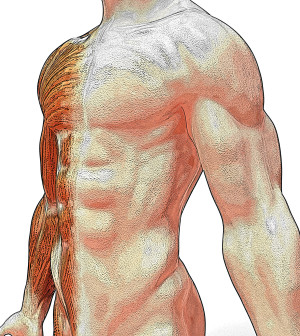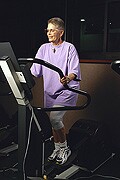- 8 Ways to Increase Dopamine Naturally
- 7 Best Breads for Maintaining Stable Blood Sugar
- Gelatin vs. Collagen: Which is Best for Skin, Nails, and Joints?
- The Long-Term Effects of Daily Turmeric Supplements on Liver Health
- Could Your Grocery Store Meat Be Causing Recurring UTIs?
- Are You Making This Expensive Thermostat Error This Winter?
- Recognizing the Signs of Hypothyroidism
- 10 Strategies to Overcome Insomnia
- Could Artificial Sweeteners Be Aging the Brain Faster?
- Techniques for Soothing Your Nervous System
Aerobics Might Boost Brain Health for Older Adults


TUESDAY, Nov. 12Older adults can boost their brain health by engaging in aerobic exercise, according to a new study.
Researchers found that, in addition to improving physical fitness, activities such as running or biking can enhance memory and brain function by increasing blood flow in specific parts of the brain.
The study authors said their findings are particularly important since staying mentally sharp is a greater concern than social security or physical health among U.S. adults aged 50 and older.
“Science has shown that aging decreases mental efficiency, and memory decline is the No. 1 cognitive complaint of older adults,” study author Sandra Bond Chapman, chief director of the Center for BrainHealth at the University of Texas, Dallas, said in a center news release. “This research shows the tremendous benefit of aerobic exercise on a person’s memory and demonstrates that aerobic exercise can reduce both the biological and cognitive consequences of aging.”
The 12-week study involved sedentary adults between the ages of 57 and 75. The participants were divided randomly into two groups: an exercise group and a comparison group that didn’t exercise. The exercise group had supervised training sessions that involved either riding a stationary bike or working out on a treadmill for one hour three times a week. The participants’ thinking ability, brain blood flow and cardiovascular fitness were assessed when the study began, after six weeks and again after 12 weeks.
“One key region where we saw increase in brain blood flow was the anterior cingulate,” study collaborator Sina Aslan, founder and president of Advance MRI, said in the news release. “The anterior cingulate has been linked to superior [mental ability] in late life.”
The study, published online in the journal Frontiers in Aging Neuroscience, also found that those in the exercise group who showed improvements in their memory also had increased blood flow to the hippocampus, the key brain region affected by Alzheimer’s disease.
Since noninvasive brain-imaging techniques allowed the researchers to identify brain changes before any improvement to the participants’ memory, measuring brain blood flow could help doctors assess brain health and the effectiveness of treatment strategies.
“The combination of physical and mental exercise may be the best health measures to improve overall cognitive brain health,” Chapman said. “We have just begun to test the upper boundaries of how we can enhance our brain’s performance into late life. To think we can alter and improve the basic structure of the mature brain through aerobic exercise and complex thinking should inspire us to challenge our thinking and get moving at any age.”
More information
The U.S. Centers for Disease Control and Prevention provides more information on the health benefits of exercise.
Source: HealthDay
Copyright © 2026 HealthDay. All rights reserved.










